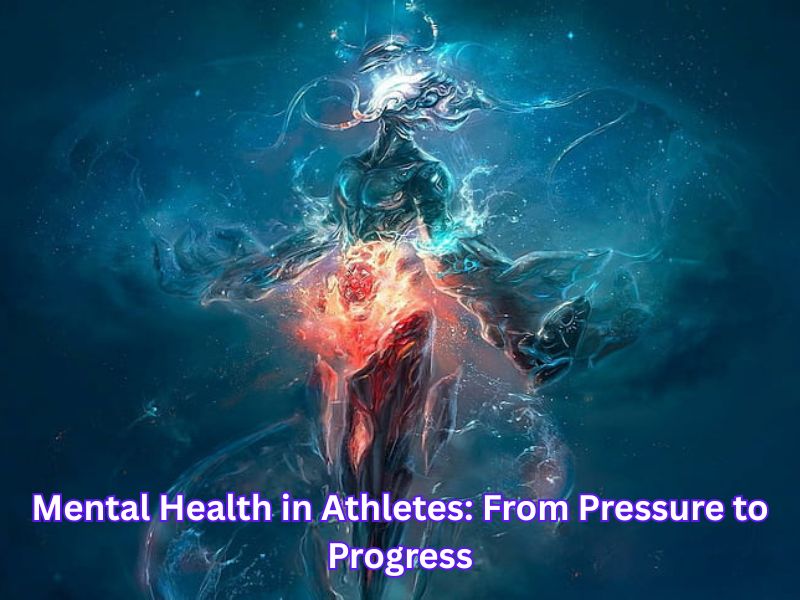Mental Health in Athletes: From Pressure to Progress

Strong 8k brings an ultra-HD IPTV experience to your living room and your pocket.
More Than Just the Game
We cheer when they win and criticize when they lose, but we often forget the human behind the jersey. Athletes are known for their physical toughness, but their mental strength is just as important and often overlooked. In recent years, the topic of mental health in athletes has come into the spotlight, revealing a side of sports many had ignored for too long.
The pressure to perform at the highest level, stay injury-free, meet expectations, and maintain public image can create enormous mental strain. This post dives into that world—where pressure meets personal battles and shows how athletes are moving toward progress.
The Invisible Load: What Athletes Really Carry
Behind the Training and Trophies
Athletes dedicate their lives to performance. Early wake-ups, tough workouts, strict diets, and minimal rest become part of their identity. While this discipline builds champions, it also builds stress.
The constant expectation to be perfect—to never miss a shot or lose a race—can become overwhelming. One poor performance may feel like a career-defining moment. That fear becomes internalized, creating emotional pressure that most people never see.
The Fear of Speaking Out
In many sports cultures, mental toughness is prized. But that often gets misinterpreted as staying silent about pain. Many athletes avoid opening up because they're afraid it will make them seem weak, cost them playing time, or damage their reputation.
Instead of asking for help, many push through with silent suffering. That silence can lead to burnout, anxiety, depression, or worse. The reality is: mental health should be seen as a strength, not a setback.
When Athletes Speak: Real People, Real Struggles
Finding Strength Through Recovery
One WNBA star returned to the court after a rough season, not just physically healed, but emotionally renewed. She didn’t just treat her injury with rehab and workouts. She also went through therapy and started journaling. These simple, daily efforts helped her rediscover consistency and emotional balance.
Today, she performs with confidence and calm. Her story shows that recovery isn’t just about muscles—it’s about the mind, too.
A Cyclist’s Long Journey Toward Self-Acceptance
A European cyclist once stood at the sport's top, competing in major events and winning races. But behind closed doors, he struggled with disordered eating and compulsive training. To the world, he was fit and fast. Inside, he was fighting to survive.
After years of hiding, he faced a personal collapse that forced him to seek therapy. He learned to deal with deeply buried emotions and built a new life that included helping others navigate similar struggles. His experience shows how even top athletes can face the same inner battles as anyone else.
The Bigger Picture: What the Numbers Show
Startling Trends in College Sports
Mental health issues aren't limited to professionals. In college athletics, the situation can be just as serious:
- Suicide is among the leading causes of death in student-athletes.
- Nearly 1 in 5 college athletes report symptoms of depression.
- Over a quarter of female athletes experience anxiety daily.
- Disordered eating affects a significant majority of student-athletes.
These numbers are not just statistics. They are real people—teammates, classmates, friends—struggling without the support they need.
Underreporting Is a Major Problem
Even when athletes are facing mental health challenges, many don't ask for help. Some studies show that while around 30% of student-athletes deal with mental health issues, only about 10% seek help.
Why? Fear of judgment. Lack of time. No idea where to go. And in some cases, they don’t even realize what they’re experiencing is a mental health concern. That’s why education and awareness matter so much.
Moving Forward: What Needs to Change
Build a Safe Culture
Athletes need an environment where it’s okay to talk about their mental health. This starts with the people around them—coaches, trainers, teammates, and even fans. Encouraging open conversations creates trust and reduces shame.
A coach who checks in regularly, a team that looks out for one another, and a sports organization that prioritizes wellness over wins can make a big difference.
Offer Real Support—Not Just Words
Mental health resources should be part of every athletic program. That includes licensed counselors, access to therapy, workshops, and clear policies that support time off when needed.
Support shouldn’t just be there after a crisis—it should be proactive and built into the system. It should be as normal as going to the gym or getting treatment for a sprained ankle.
Let Athletes Help Athletes
Peer support is powerful. When athletes share their own stories, it helps others feel less alone. Support groups, mentoring, and honest conversations between teammates can be the first step toward healing.
Progress happens faster when someone can say, “I’ve been there, too.”
Why It Matters
The conversation about mental health in athletes is more important now than ever. It’s not just about protecting careers—it’s about protecting lives. An athlete’s mental well-being influences their performance, relationships, and long-term happiness.
When we support athletes emotionally, we help them become better not only in their sport but in life.
FAQs
What mental health issues are most common in athletes?
Athletes frequently deal with anxiety, depression, burnout, and eating disorders. These challenges can stem from pressure, injury, overtraining, or isolation.
Why do athletes avoid seeking mental health help?
Many fear being judged or losing playing time. They also worry that speaking up might change how others see them—as weak, unreliable, or not competitive enough.
What can be done to improve mental health support in sports?
Sports organizations can include mental health resources in their programs, train coaches to notice signs of distress, and encourage open conversations.
Are athletes really talking about this publicly?
Yes. Many high-profile athletes now share their struggles. Their openness helps reduce stigma and encourages others to get help when needed.
What steps can athletes take for better mental health?
Rest, therapy, honest conversations, and regular check-ins with mental health professionals can help. Having a strong support system is also key.
Final Thoughts: Let’s Change the Game
It’s time to stop pretending that mental health is a side issue in sports. It’s central. Strong minds build strong athletes—and that strength comes from balance, not burnout.
Whether you're a coach, a fan, a parent, or an athlete, you have a role to play. Support honesty. Normalize the conversation. Celebrate emotional strength as much as physical skill.
Let’s move from pressure to progress—together.
Note: IndiBlogHub features both user-submitted and editorial content. We do not verify third-party contributions. Read our Disclaimer and Privacy Policyfor details.





